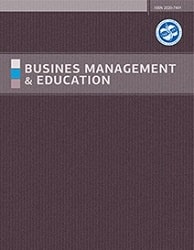RELATIONSHIP BETWEEN UNIVERSITY EDUCATION IN STRATEGIC MANAGEMENT AND CHESS IN A BOTH LEARNING PROCESS: AN APPROACH ACROSS LEARNING PATHS
RELATIONSHIP BETWEEN UNIVERSITY EDUCATION IN STRATEGIC MANAGEMENT AND CHESS IN A BOTH LEARNING PROCESS: AN APPROACH ACROSS LEARNING PATHS
Author(s): Justo De Jorge-MorenoSubject(s): Higher Education , Educational Psychology, Management and complex organizations
Published by: Vilnius Gediminas Technical University
Keywords: chess; strategic management; individual differences; learning path; university education;
Summary/Abstract: Purpose – In this work, a reflexive experiential learning process is collected, which relates concepts the strategic management and learning the game of chess in a flipped classroom and blending learning process for the 2017/18 and 2018/19 courses. Research methodology – The method followed has been the initial approach of the learning curves and the time series of the analysis of learning patterns in the game of chess. Also, for the study of the relationship between the game of chess and its analogy with strategic management, we used a questionnaire, and we apply cluster and network analysis. Findings – The main results reveal the existence of different learning patterns (linear, quadratic, random walk), associated with the various skills of the students. Likewise, different learning groups have been identified concerning the times and learning levels by activities. The underlying idea is the motivation that the game of chess exerts on students to foster greater understanding. Research limitations – The limitations are related to the size of the classroom and the different initial levels of chess knowledge, which have been a real challenge to carry out this work. Finally, the combination of activities, between chess and strategic management knowledge is complicated to handle, requiring large doses of planning. These limitations are perhaps challenging to solve, although possible help could be associated with more teachers being involved in the process. Practical implications – The simultaneous learning of chess with the consequent increase of cognitive skills and Strategic Management concepts could intensify the motivation of the student and generate a virtuous circle that drives both areas. Originality/Value – This new experience in Spain contributes to filling a perhaps significant gap in the literature. In parallel, the practice of chess in the classroom has corroborated a level of commitment and motivation of students in the knowledge of the concepts of strategic management. The results achieved could suggest the incorporation of chess practice as a motivating factor in management subjects.
Journal: Business, Management and Education
- Issue Year: 18/2020
- Issue No: 2
- Page Range: 226-246
- Page Count: 21
- Language: English

